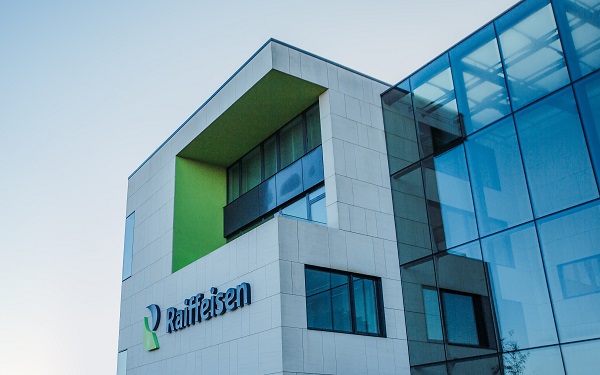 Credit: Raiffeisen
Credit: Raiffeisen
Despite the COVID-19 pandemic, Luxembourgish bank Banque Raiffeisen has recorded healthy financial growth for 2020; as of 31 December 2020, the bank's total balance sheet stood at €9.641 million (up 8.2% over one year).
In the midst of the global pandemic and related lockdowns, Raiffeisen quickly took the necessary measures to maintain the continuity of its services while offering protection to its employees and clients.
Financial Growth
At the end of December 2020, the balance sheet total stood at €9.641 (up 8.2%).
Deposits from non-banking clients increased by 7.6% to reach €8.4 billion. Two-thirds of this growth came from deposits from individual clients, motivated by a decline in household savings and by the fall in private spending during the crisis. Deposits from professional clients also showed solid growth.
Assets under management increased by 7.9%, particularly due to the success of the bank's various asset management formulas, which saw their outstandings increase by 16%.
An increase of 7.5% in customer loans, including leasing transactions, confirmed Raiffeisen's position as a benchmark player in the financing of the local economy. More than 60% of growth came from loans to private customers, mainly for the acquisition or construction of new housing. This activity was only slightly affected by the crisis. At the same time, the bank continued to support the professional sector, as evidenced by the constant increase in the volumes of loans granted to Luxembourg companies and public entities (up 9% compared to 2019).
In 2020, the bank also recorded a net interest income gain of 6.2%, mainly due to volume growth.
Net commissions were up 3.9% compared to the 2019 fiscal year, driven by financing and investment activities. The latter took advantage of the strong stock market activity recorded during the first and last quarters of the year, combined with good growth in customer securities deposits (up 11%). Conversely, payment activities were directly impacted by health restriction measures, with a drastic reduction in transactions carried out at bank counters, cash withdrawals from ATMs and payments by credit card abroad, among others.
The bank's operating costs remained stable compared to the previous year. The health crisis has caused a significant delay in recruitments. This element was offset by an increase in IT costs, following the increased use of digital tools (teleworking, online banking) and continued investments in the security and transformation of the bank's IT system.
As of 31 December 2020, the bank's workforce totalled 654 employees, down slightly from the previous year.
The application of a strict policy of prudence in the risk management of the bank's loan portfolio led to a net allowance for value adjustments of €14 million. This amount makes it possible to cover all of the credit risks identified during the year, both on the commitments of certain specific debtors and on the commitments of the business sectors hardest hit by the health crisis.
Banque Raiffeisen thus posted a net income of €18.8 million for the 2020 financial year, an increase of 8.1% compared to the previous year.
Membership
In 2020, the bank, which now has 40,503 members (up 9.0%), granted OPERA advantages for a total amount of €1.2 million, an increase of 9.4% compared to to the previous year.
Strengthened support during COVID-19
While the pandemic has had a strong impact on the Luxembourg economy, Banque Raiffeisen remained committed to supporting the economic recovery by providing active support to its business customers with cash flow difficulties. In collaboration with the Luxembourg government, the bank quickly proposed the implementation of measures such as the state-guaranteed loan and the granting of moratoriums on loans, offering companies the possibility of benefiting from the postponement of the repayment of capital and interest on their loan. The bank thus granted a total of 1,500 moratoria to its professional and private clients whose finances were affected by the crisis.
Sustainability
As part of its cooperative corporate social responsibility (CSR), Banque Raiffeisen pursued its ambitions of contributing to sustainability through its product and service offerings last year. The bank broadened its range of solutions for individuals by launching the new R-Eco personal loan, as well as a new range of sustainable and ecological Visa cards, thus strengthening its commitment to the environment and the climate.
Novelties and Investments
In order to develop its cooperative aspect, Banque Raiffeisen now offers its members the subscription of profit shares. These securities constitute an investment opportunity for member clients and also help to contribute to the development of the bank and the national economy.
Other major innovations in 2020 included the redesign of the R-Net (online banking) application, which now offers new features and more intuitive navigation.
In addition, Banque Raiffeisen has signed a new partnership with the Wüstenrot Bausparkasse bank in order to offer a more comprehensive range of banking services tailored to the needs of its customers.
The bank also continued its efforts to modernise its branches, with new branches being built in Bascharage, Differdange and Esch-Belval and modernisation or reconstruction work being planned for 2021 on the Niederanven and Wiltz sites.








